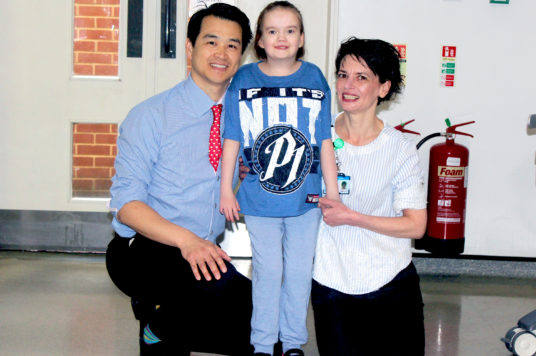Magnetic controlled ‘growth rods’ used in scoliosis spinal surgery at St George’s for the first time
Surgeons at St George’s Hospital in south London have used adjustable telescopic magnetic rods for the first time to straighten the spine of a young girl with severe scoliosis.
Patient, Harleigh Jackson, 11, underwent the procedure at St George’s before Christmas. She also has Russell-Silver syndrome, a congenital condition which restricts growth.
She was diagnosed with early onset scoliosis, which led to rapid and severe curvature of the spine which traditional methods – including a brace – were unable to correct.
As well as straightening Harleigh’s spine, the rods – which were fitted surgically by Mr Darren F. Lui, Consultant Spinal and Orthopaedic Surgeon – can be adjusted remotely using a magnet in an outpatient setting to gradually grow the spine.
The standard treatment using traditional growing rods requires children to have a general anaesthetic every six months and then manually lengthen the rods to grow the patient – which increases the risk to the patient, as well as the chances of complications such as infection.
The magnetic growing rods used by Mr Lui avoid the need for regular surgery and repetitive general anaesthetic.
Harleigh, who was also born at St George’s, was discharged home before Christmas, and attended for her first outpatient appointment today, where surgeons carried out the first adjustment of the rods in her spine. She is now able to walk without a supportive brace which was restrictive and cumbersome, and can be difficult for children to live with.
Harleigh’s mother, Karina, said: “This was a really big operation for Harleigh, and she has already spent so much of her life in hospital. However, we’ve noticed the difference already – she stands more upright, and was able to walk confidently up and down the ward in a way she wouldn’t have been able to before. It’s a big game-changer for her.”
Mr Lui said: “Screws are inserted by minimally invasive surgical techniques into the top and bottom of the spine. The rods are then passed under the muscle between the two small wounds to avoid a long incision, so minimizing the trauma of surgery. The ability to lengthen the rods remotely – without having to go in and operate on a regular basis – is a major step forward for us.”
He continued: “This is going to make a big difference to the patients we treat. Harleigh is an incredibly bright, brave and determined little girl, so the fact we have been able to make a positive difference to her quality of life is fantastic.”
Harleigh will attend St George’s on a regular basis for remote lengthening of the rods in her spine, and surgeons are confident this will see almost a 5 centimetre increase in her height as a result of the operation.
The product is called the MAGEC(r) system by NuVasive, Inc.


